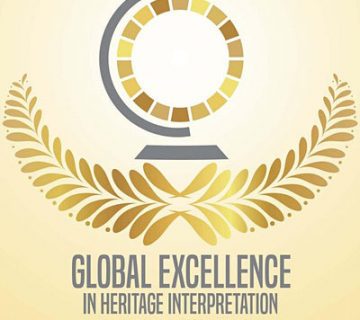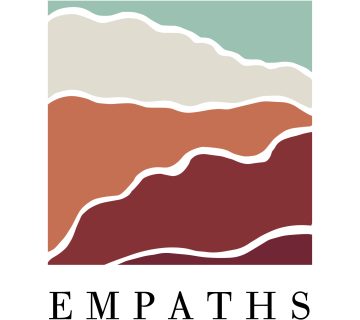To achieve excellence in European heritage interpretation, cooperation is key. For all who like to discover the best ways to do that, SIMID organises Interpret Europe’s first spring event from 19-21 May 2017 in Prague.
Across the continent, heritage interpretation enjoys varying degrees of recognition as a profession. In order to unify the quality of our work and training we are striving to enhance cooperation and cross the borders that divide us.
SIMID, the Czech Association for Heritage Interpretation, is pleased to invite interpreters from all over Europe to Prague to enjoy Interpret Europe’s first spring event. It will take place at Toulcův dvůr, a historic farm estate which has recently been transformed into an ecological learning centre. The event will encompass keynote speeches as well as workshops and presentations in parallel sessions of three strands. The conference will also include study visits to Prague in order to discuss heritage interpretation on site.
IE coordinators and their teams are invited to arrive on 18 May, one day in advance, to get into an exchange and to discuss how Interpret Europe can develop its internal structure. IE certified trainers (CIGT) and guides (CIG) are invited to two pre-event courses in order to improve their skills:
- 16-17 May: Interpretive Guide Trainer Course for CIGs – For more info visitâ¦
- 18 May: Interpretive Host Trainer Course for CIGTs – For more info visitâ¦
For the full programme click here.
For the parallel sessions, we ask for papers focusing on two subjects:
- Reaching for excellence: Heritage interpretation in higher education
The differences in recognition of heritage interpretation are reflected in its status as an academic discipline and its representation in the course offering of higher education institutions. Heritage interpretation as a separate degree course is still the exception. As a module it is situated within diverse disciplines. Consequently, the approach to teaching and research is varied.
We invite papers that reflect the diversity of heritage interpretation at higher education institutions across Europe. In particular, we are interested in:
- Insights into the quality of teaching and interpretation
- The impact of where heritage interpretation is situated within higher education institutions on course content and research
- The existing and/ or potential linkages between practitioners and professional organisations on one hand and higher education institutions on the other.
- Turning challenges into opportunities: Heritage interpretation in Eastern Europe
Billions of Euros are being invested in Eastern European countries through EU structural funds, parts of the investment support heritage conservation and interpretation. New exhibitions, museums and visitor centres are being built, tens of thousands of interpretive panels erected. Who is delivering the projects, how is the quality assessed and what know-how is used?
We are looking for papers dealing with the following topics:
- Grant support available to heritage interpretation projects in Eastern Europe and policies behind the grants
- Good practices in delivering heritage interpretation projects across the whole of Europe
- Fostering policies that improve the quality of heritage interpretation projects.
Practitioners are welcome as we will also be discussing business opportunities in the field of heritage interpretation across Eastern European countries.
In both strands we would encourage authors to also explore future opportunities and threats regarding their topic. Proposals for papers are due by 28 February 2017. Submit an online form. The proposals will be assessed by an event committee in order to achieve the maximum event output.
Reaching out: Interpret Europe’s training programme
Interpret Europe’s Training Team will contribute to the parallel sessions by introducing
small ‘tasters’ of its training programme. One focus will be on courses and modules that already run in different European countries, such as the CIG course for guides, the CIGT course for guide trainers, and the CIH course for interpretive hosts. Another focus will be on courses and modules that are being prepared for the immediate future (about interpretive writing, interpretive planning and live interpretation). All these offers will be introduced as workshops by IE certified trainers.
The venue
Toulcův dvůr is a former farm with its first written record as far back as 1362. It keeps its charm although it is now surrounded by a newly developed neighbourhood. Its ten-hectare area includes paddock, orchard and a park making it a nice natural oasis in the Czech capital. It is Run by a conglomerate of NGOs and is buzzing with events every day of the year.
Participation fee
The participation fee for the event (without pre-event courses) will be:
â¬99 for early bird members (registration by 31 March 2017)
â¬119 for members registering after 31 March 2017
â¬139 for early bird non-members (registration by 31 March 2017)
â¬159 for non-members registering after 31 March 2017
The participation fee covers the complete programme, meals and study visits. Not included in the price are the Saturday dinner in Prague and accommodation, which are based on individual choice.
Please be aware that the number of participants is limited to 80.
The registration will open on 16 January 2017.
Accommodation
Accommodation is not included in the event price. Participants can choose from three accommodation standards within ten minutes’ walk/drive from the event venue:
- Hostel style accommodation with shared bathrooms starting from 10⬠/night.
- Medium priced 2* hotel starting from 15â¬/night (transport to the event place will be provided).
- Top 4* hotel starting from 59â¬/night.
SIMID has made reservations in these venues and will assist participants with bookings.
You can find the event programme and more details at www.interpret-europe.net/events.
We do hope to meet you in Prague.
The event is being managed by a Czech-Slovenian international team. Michal Medek is the Event Manger while Helena Vičič is responsible for communication with participants and will be your main contact.
Michal Medek teaches heritage interpretation at Masaryk University. He is a board member of SIMID and an IE Certified Interpretive Guide Trainer. Among other academic credits he achieved postgraduate certificate in interpretation at the University of Highlands and Islands (UHI). You can contact him at: michal@medek.us.
Helena Vičič from Slovenia is an IE Certified Interpretive Guide Trainer, studying interpretation at the University of the Highlands and Islands (UHI) in Scotland. You can contact her at: helena.vicic@gmail.com.
To cite this article:
Vičič, H., Medek, M. (2016) âCrossing borders: Join us at our spring event in Pragueâ. In Interpret Europe Newsletter 4-2016, 30
Available online:
https://www.interpret-europe.net/fileadmin/Documents/publications/Newsletters/ie-newsletter_2016-4_winter.pdf




